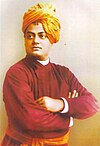Shuddhananda
He studied at the City College of the University of Calcutta,[3] prior to joining the Alambazar Math of the Ramakrishna Mission in 1897.
He had a group of friends all of whom became directly associated with Ramakrishna order in the later years as monks and all were disciples of Vivekananda.
[2]: 12 He spent most of his time in spiritual pursuits and reading and discussing religious books in the company of his friends.
[2]: 14 Sudhir, like other youths of his time in India, was greatly inspired by the stirring lectures of Vivekananda in the Parliament of World Religions, 1893 and elsewhere in the West.
He closely followed the lectures published in Indian Mirror Newspaper and became attracted to the ideals of Vivekananda.
Sudhir was initiated by Vivekananda into monastic vows (sannyasa) in May 1897 and was named as Shuddhananda (Shuddha: pure).
His brother was Prakashananda (called Sushil Maharaj), who also served the Ramakrishna Order as a monk and was also a direct disciple of Vivekananda.
[2]: 142 In April 1897 when Vivekananda was laying down the guidelines for the future monastic order only Shuddhananda volunteered to take his dictation.
[2]: 25 Vivekananda had also asked Shuddhananda to maintain a diary of the Math and prepare weekly report of its activities.
This close association familiarized Shuddhananda with his ideas regarding the past, present and future of Ramakrishna Order, the essence of the scriptures and the problems being faced by the society.
Later, at the behest of Vivekananda, Shuddhananda worked as an assistant to Trigunatitananda, who was the editor of Udbodhan, the Bengali magazine of the Ramakrishna Order.
He established a study circle in Belur Math to enable brother monks to learn the essence of the scriptures.
[2]: 34 When Trigunatita left for the Americas in 1902, Shuddhananda was asked to take the editorship of Udbodhan by Saradananda and Brahmananda.
He led the effort of setting up a Vivekananda Society in Calcutta to spread the ideas and ideals and would contribute actively to the cause.
Shuddhananda was also responsible for planning and organizing the historic first Monk's Conference of Ramakrishna Order in Belur Math.
The centenary celebration included a Parliament of Religions in Calcutta, which was chaired by among other dignitaries, Rabindranath Tagore.
He is renowned in literary and cultural circles as the translator of most of Vivekananda's works into Bengali, and as the best exponent of his thoughts and ideals.
He also encouraged Arupanananda to pen his reminiscences of Sarada Devi (called the "Holy Mother") and worked with him in compiling and editing the book.
